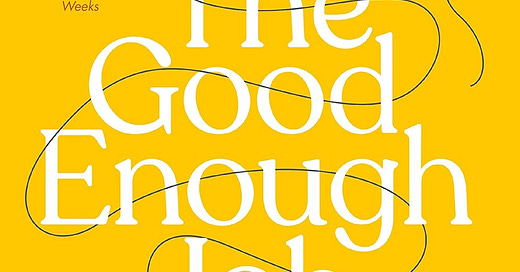What's "Good Enough" For Your Career?
We need to define what a "good enough" job is to avoid workism.
I recently finished the book titled The Good Enough Job: Reclaiming Life from Work by Simone Stolzoff. The book is about how to avoid workism - the belief that employment is not only necessary for economic production but is also the centerpiece of one's identity and life purpose.
The book provides a few anecdotes where people are defined by their careers, and how they rectified their situations.
There’s the story about Divya Singh, who worked her fingers to the bone for over seven years building her startup, only to get screwed over by her partner. She had to find her self-worth outside of her career with travel, renewed hobbies, and communal living.
There’s Fobazi Ettarh, who loved books so much that she became a librarian. Then she realized how underpaid and overworked librarians are, and how those whose careers are their “passion” are often taken advantage of by their superiors.
Then there’s Khe Hy, who has been consumed with status ever since he was a child. This mindset drove him to become one of the youngest Managing Directors at BlackRock, the largest asset management firm in the world. But it also caused a high amount of stress and anxiety, which led to Khe losing a chunk of his hair one day due to stress-related alopecia.
The book tells many more stories about how work took over people’s lives and identities.
My Struggle with Workism
When you read this section, it might seem like it’s all doom and gloom for me. It’s definitely not - I have a loving family, great friends, and lots of opportunity. I have a blessed life, but workism has definitely infected my mind like a virus.
I’ve struggled with workism throughout my career, but the feeling has been amplified ever since I became an entrepreneur over a decade ago. I inextricably and irrationally link my self-worth to my career. I’ve got impostor syndrome. Recently, my workism has led to a lot of anxiety and stress to the point where I’m now going through therapy.
We’re told about how we should chase our passions, and you “never work a day in your life” if you enjoy your job. This is somewhat true, but like Fobazi Ettarh found out, the grass isn’t always as green as you think it is.
For me, chasing my passions has led to high levels of stress, envy of others who have achieved more, and opportunity cost. I don’t regret my choices, and I’ve learned a lot and met many of great people along the way. But maybe I would have been better off with an OK corporate job throughout my career? Maybe this would have led to less self-doubt and anxiety? I’ll never know.
Covid exaggerated the problem of workism. Working from home has blurred the lines between life and work.
Nancy Rothbard, a Professor of Management at Wharton, says there are two types of employees: 1) Integrators - people who don’t mind blurring the boundary between work and home, and 2) Segmentors - those who have a strong desire to separate work and life.
Working from home makes it much more difficult to become a segmentor. Instead of leaving the office to signal the end of our work day, we now need to actively make a choice of when our day ends. For example, the other night I worked until 10PM. And I could have worked much later.
Social media also takes a toll on those with workism. Influencers love to flex about how much money they make and all the nice houses and cars that they own. Sure, a lot of this content is fake, but it’s still difficult to avoid the comparisons of your shortcomings to their success. Comparison truly is the thief of joy.
What We Can Do to Avoid Workism
There are a few solutions that The Good Enough Job suggests to find value outside of work.
First of all, we shouldn’t expect our jobs to provide a transcendent life experience. Yes, you should try to enjoy your job, but expecting it be the centerpiece of your existence will only lead to disappointment.
Ask yourself these questions:
Who are you when you’re not producing? What activities outside of your job define who you are?
Divya Singh discovered that living within a tight-knit community and sharing veryday experiences with others helped define her personality outside of work.
If you could pursue something, but you couldn’t tell anyone that you did it, would you still do it?
We often do things to impress other people. What if we couldn’t tell anyone about our accomplishments? Would that change our choice of activities?
Don’t play the status game like Khe did. While status can drive you, it can be a drug that you may become dependent on.
Don’t let others (especially social media influencers) determine what it means to be successful. You have to define this yourself.
You need to define what is “good enough”.
Conclusion
I’m torn.
On one hand, I definitely see the benefits of a clear separation of work and life, and how self-worth needs to be defined holistically, not just by one’s career.
OTOH, I wonder - why can’t we have it all? Why can’t we have a career that we love - a job that we’re passionate about and gets us fired up every morning - and still find meaning and value in things we do outside of work?
Obviously I still need to define what is good enough for my career.
How have you defined what’s good enough for you?
I hope you enjoyed this post! If you did, I’d appreciate if you subscribed to my blog for more content about startups, business, and life.




